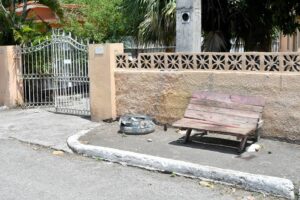
WATCH: Dr Michelle Hamilton – a scientist for all seasons
Prior to 2008, all samples for HIV testing in Jamaica had to be sent to the National Public Health Laboratory in Kingston for confirmation, leading to delays.
All that would change when Dr Michelle Hamilton, physician and educator was seconded to the Ministry of Health as Director of Immunology, taking charge at the National Laboratory Services that same year.
Hamilton, in an interview with OBSERVER ONLINE said she had the “satisfaction” of working in the area of HIV/AIDS since the Immunology department offered a lot of the services for the management of the disease.
She explained that she was involved in the HIV testing algorithm which, before she joined the ministry, was centralised at the National Public Health Laboratory.
“This means that samples from all over the country had to come to the National Public Health Lab for testing. And you can imagine there would have been delays,” Hamilton said.
At the time, the medical doctor said there was the thrust for the development of an HIV field testing algorithm, “that is the development of a process that would allow testing for HIV to take place at the point of care where you’re contacting the individuals”.
Hamilton said once the algorithm was developed, the only samples that are sent to the national public health laboratory are those needing confirmation “because they did not give you a definite answer or samples that were coming to us to have some quality assurance of the processes that were being used in the field”.
Hamilton is a pioneer in other areas as well. The second of two children for her parents, she explained that her parents had great academic dreams, great academic potential but were unable to realise their potential to the fullest.
“So they created for us an environment that facilitated learning and out of that environment my sister and I would do experiments around the house. We grew plants, we had encyclopedias at home and we’d be looking at the heart and things like that”.
Hamilton’s interest in the field of science heightened in high school.
“Going further in biology in particular sparked my interest in the sciences. At that time I thought if you did the sciences you had to do medicine and so my focus was on medicine,” she shared.
It was not until Hamilton arrived on the Mona Campus of the University of the West Indies (UWI) that “It became apparent that there were careers that I knew nothing about that I would be interested in. So I became more and more interested in a career path in the sciences”.
This was cemented in her mind when she started doing biochemistry during second year studies at the UWI.
“To a certain extent it was all over bar, the shouting,” she said with a smile.
“I really enjoyed it and I pursued it and after finishing undergraduate work I then proceeded to do a master of philosophy in biochemistry,” said Hamilton.
It was while doing her master’s that Hamilton started to work with pathogenic organisms (those that cause diseases).
She said: “I was fascinated by them so I then moved on from the University of the West Indies to the University of Edinburgh in Scotland were I did a Phd in medical microbiology”.
“I started off thinking I was going to go straight into medicine but finding other things along the way that really captivated me I found myself in an ever unfolding career in the sciences,” she noted.
After returning to Jamaica from Scotland, Hamilton did a brief stint in industry where she said she became aware of the fact that the ingredients that go into any product have a marked effect on the bottom line.
“I became aware that there are some components that we would like to incorporate in our products in Jamaica but they were just so expensive. In order not to pass on that expense to the consumer we were using some of the substitutes”.
Hamilton said this bothered her, “Because the substitutes that we were using were not in all cases performing the way the main ingredient – Xanthan gum – would have performed”.
Hamilton explained that Xanthan gum is a stabiliser and a thickening agent. When used in salad dressings, “it allows you to see all the parts in the dressing suspended. You don’t want to see a salad dressing with air fluid and some pieces at the bottom,” she stated.
Meanwhile, Hamilton also highlighted the effects of the COVID-19 pandemic on the national public health lab, which she said is in a much stronger place now because of the work it did during the pandemic.
“In developing systems for the testing of COVID, we have been able to increase the laboratory capacity for testing that will allow us to be able to test for other agents that may be of significance in the future. So we have enhanced our capacity for the testing of new and emerging pathogenic organisms,” she elaborated.
“So we think about all the things that COVID has done that we wish it hadn’t done, but let us also be aware that through the opportunities for the development of the laboratory services for COVID testing, we are now in a better position to test any new and emerging pathogen which may come our way,” she added.





















